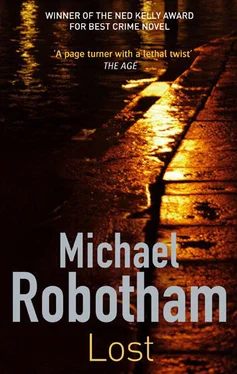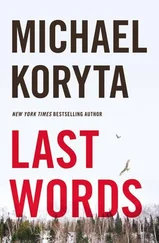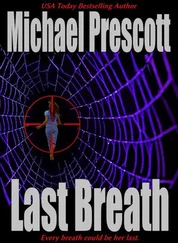“Luke is dead, Daj. What day did I come?”
“Hmmphf! It was a Sunday. You had the newspapers and you were waiting for a call.”
“How do you know?”
“The mother of that missing girl called you. She must have been very upset. You were telling her to be patient and wait for the call.”
She returns to brushing her arms with her hands.
“I need to see that envelope.”
“You won't find it unless I tell you where it is.”
“I don't have time for this.”
“You never have time. I want you to take me for a walk.”
She's wearing her walking shoes and a warm coat. I take her arm and we shuffle along the white gravel path, moving in slow motion as her feet struggle to keep up with mine. A handful of residents are doing tai chi on the lawn. Elsewhere the gardeners are planting bulbs for the spring.
“How is the food?”
“They're trying to poison me.”
“Have you been playing bridge?”
“Some of them cheat.”
Even the half deaf can hear her.
“You really should make an effort, Daj.”
“Why? We're all just waiting to die.”
“It's not like that.”
I stop and button up the top of her coat. Spidery wrinkles radiate from her lips but her eyes haven't aged. From a distance we are mother and son sharing an intimate moment. Up close we are a stuttering monosyllabic tragicomedy played out over fifty years.
“Can I have the envelope now?”
“After morning tea.”
Inside we sit in the dining room and go through the ritual of stilted conversation served with jam and cream. The manager is wandering between the tables.
“Hello there! How lovely to see you. Isn't it nice to have your son here, Mrs. Ruiz? Maybe he'd like to come and hear Mr. Wilson's lecture on trekking in the Andes.”
I'd rather be strung up and dunked headfirst into a vat of cold porridge.
Daj announces in a loud voice, “Yanko was always the strongest baby. I needed both hands to pull him away from the bottle. He didn't want the breast.”
“Nobody wants to know that, Daj.”
Louder this time: “His father was a Nazi, you know. Like Arnold Schwarzenegger's father.” I feel my cheeks redden. She's on a roll. “I don't know if he looks like his father. There were so many of them. Maybe all their sperm got mixed up inside me.”
The manager almost chokes and quickly makes her excuses before escaping. Her parting look reminds me of those my teachers used to give me when Daj came to Open Day.
With the tea grown cold and a token scone left on the plate, I go back to Daj's room and collect the envelope. On my way out I drop into the manager's office and write a check.
“You must love your mother very much,” the secretary says.
I look at her impassively. “No. She's my mother.”
Back in the car I open the large padded envelope. Inside are copies of the original postcard and envelope, along with the DNA tests and analysis of the ink, stationery and hair samples.
There is another letter in a plain plastic sleeve. Slipping my hand inside, I withdraw the note, blowing it open with my breath.
Dear Mrs. Carlyle,Your daughter is alive. She will remain so if you cooperate. Any mistakes and she will die. Her life is in your hands.We require two million pounds worth of superior quality cut diamonds, with no stone smaller than a carat. You will separate these stones into four velvet pouches. Each pouch must be taped to a square of quarter-inch-thick polystyrene foam and then double sealed in fluorescent plastic. Each package must be no more than 6 inches long, 21⁄2 inches wide and 3⁄4 inch deep. They are to be placed inside a 20-inch pizza box.Three days from now you will place an advertisement in The Sunday Times travel classifieds seeking to rent a Tuscan cottage. This will contain a cell-phone number for further communications.You must always answer the phone, Mrs. Carlyle. Only you. Anyone else picks up and Michaela dies.No negotiation will be possible. No excuses are acceptable. If the police are involved, you know the outcome. YOU HAVE ONE CHANCE.
The letter is neatly typed and appears to have been laser printed. Although there is no attempt at childish handwriting this time, the emotional blackmail is just as great.
I placed the advertisement. I obtained the cell phone. I must have believed Mickey was still alive. Maybe it was the weight of evidence rather than conclusive proof that convinced me. We convicted Howard on circumstantial evidence and perhaps I resurrected Mickey on anecdotes and inferences.
“At least it's confirmation,” says Ali, reading the DNA report.
“But it doesn't change the story. Campbell won't reopen the investigation or admit mistakes were made. The forensic experts, lawyers, police witnesses and politicians aren't going to backtrack on Howard's conviction.”
“Do you blame them? Do you really want to set him free?”
“No.”
“Well, why are we doing this, Sir?”
“Because I don't believe the ransom was a hoax. I think she's alive! Why else would I have risked everything?”
I stare across the road at a bus shelter where a young girl, barely twelve, looks longingly down the street for the 11:15 that won't arrive until 11:35.
This isn't about Howard. I don't care about reasonable doubt or innocence or guilt. I just want to find Mickey.
A storm is coming. The static electricity in the air lifts strands of hair on Ali's head and suspends them like invisible wires. Within minutes raindrops are bouncing off the windshield like marbles and the gutters are choked with leaves. Put it down to global warming or climate change, but I don't remember storms like this when I was younger.
The tires of the Vauxhall swish through the wet. Ali has a way of concentrating when she drives that brings to mind an arcade game. It's as though she expects someone to run a red light or step out from the pavement.
We cross Tower Bridge and turn east along the A2, passing through Blackheath and Shooters Hill before reaching Dartford. The storm has passed and the sky is low and gray. A cold wind picks up scraps of paper that swirl and dip along the pavements.
This is real English suburbia, with privet hedges and puddle-size birdbaths. I can even smell the lawn fertilizer and watch television three houses away through the picture windows.
The White Horse pub advertises all-day breakfasts but doesn't open until midday. Peering through the windows I see an empty bar, chairs stacked on tables, a vacuum cleaner squatting on claret carpet, a dartboard and a brass footrail along the base of the bar.
I circle around the back, Ali never more than a few feet away. The large wooden gate is shut but not locked. It leads to a bricked courtyard, full of silver kegs, with a motorbike and two cars, one of them marooned on bricks and painted camouflage green.
Just outside the door, a teenage boy, perhaps fifteen, is sitting on the hood of a car, cleaning a carburetor with an oily rag. His worn sneakers swing back and forth and his jaw moves constantly—biting off words, chewing them up and spitting them out.
Spying me, his head jerks. “FUKLEMICK!”
“Hello Stevie.”
Sliding off the car he grasps my hand, pressing his ear to my wristwatch. “Tickatock, tickatock.”
Tourette's syndrome has turned him into a riot of twitches, cusses and screeches—“a human freak show,” according to his father, Ray Murphy, the former caretaker at Dolphin Mansions.
I turn to Ali. “This is Stevie Murphy.”
“S. Murphy. Smurfy. Smurf. Smurf.” He barks the words like a seal.
Ali runs her fingers through his short-cropped hair and he purrs like a kitten.
“Is your dad inside?”
His head jerks. “FUKLEOFF! GONE!”
Читать дальше












